
Thinking that it is going to be an ordinary CBC (complete blood count) report interpretation article? Then you are wrong here we will only learn about the interpretation of the vitamins and minerals deficiencies the from CBC report
So, let’s break it down into some basic points like:
🩸What is the CBC test?
So, first we will look at the word CBC or complete blood count. we can easily interpret that it is going to be a test that relates to our blood and some sort of Counting so, let’s break it down, it is just the measurement of all the cells that are present in our blood including the red blood cells, white blood cells, platelets, and hemoglobin.
Why do we need CBC testing ?
- Usually a CBC test is recommended by a physician in order to diagnose any disorder or any disease that is causing the symptoms like fever, unintended weight loss, night sweats, bruising, bleeding, weakness or fatigue
- It is also recommended as a part of the Healthcare exam 🧪 like routine examination or when a patient is undergoing some sort of treatment like chemotherapy 💊 to see if the medication is affecting the blood cells or not.
- and when a patient is suffering from some chronic conditions like chronic kidney disease.
- Also recommended during pregnancy 🫄🏻
Why vitamins and minerals matters in CBC?
Now, we are going to discuss a very important aspect of our article which is why vitamins and minerals matter in CBC and why we need to know about the deficiency of vitamins and minerals.
So the answer is that vitamins and minerals play a very important role in the formation of the red blood cells, and in the functioning of the white blood cells and platelets.
But here in this article we will only discuss the parameters of red blood cells in CBC which particularly give information about the vitamin and mineral deficiency or anemia.
Reason behind only discussing the targeted parameters that gives us exclusive information regarding vitamin and mineral deficiency is that fluctuation of WBCs and platelets is not limited to the vitamin deficiency but also indicates a number of other problems like infections, inflammation etc.
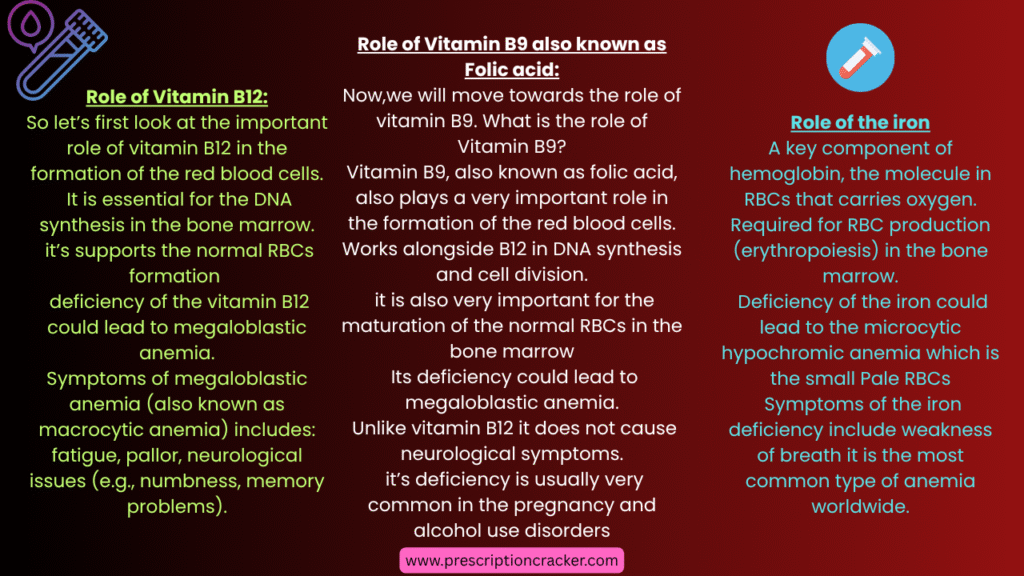
Role of Vitamin B12:
So let’s first look at the important role of vitamin B12 in the formation of the red blood cells.
- It is essential for the DNA synthesis in the bone marrow.
- it’s supports the normal RBCs formation
- Deficiency of the vitamin B12 could lead to megaloblastic anemia.
- Symptoms of megaloblastic anemia (also known as macrocytic anemia) includes: fatigue, pallor, neurological issues (e.g., numbness, memory problems).
Role of Vitamin B9 also known as Folic acid:
Now,we will move towards the role of vitamin B9. What is the role of Vitamin B9?
- Vitamin B9, also known as folic acid, also plays a very important role in the formation of the red blood cells.
- Works alongside B12 in DNA synthesis and cell division.
- it is also very important for the maturation of the normal RBCs in the bone marrow
- Its deficiency could lead to megaloblastic anemia.
- Unlike vitamin B12 it does not cause neurological symptoms.
- it’s deficiency is usually very common in the pregnancy and alcohol use disorders
Role of the iron
- A key component of hemoglobin, the molecule in RBCs that carries oxygen.
- Required for RBC production (erythropoiesis) in the bone marrow.
- Deficiency of the iron could lead to the microcytic hypochromic anemia which is the small Pale RBCs
- Symptoms of the iron deficiency include weakness of breath it is the most common type of anemia worldwide.
Which parameters In CBC reflects the vitamins & minerals deficiences?
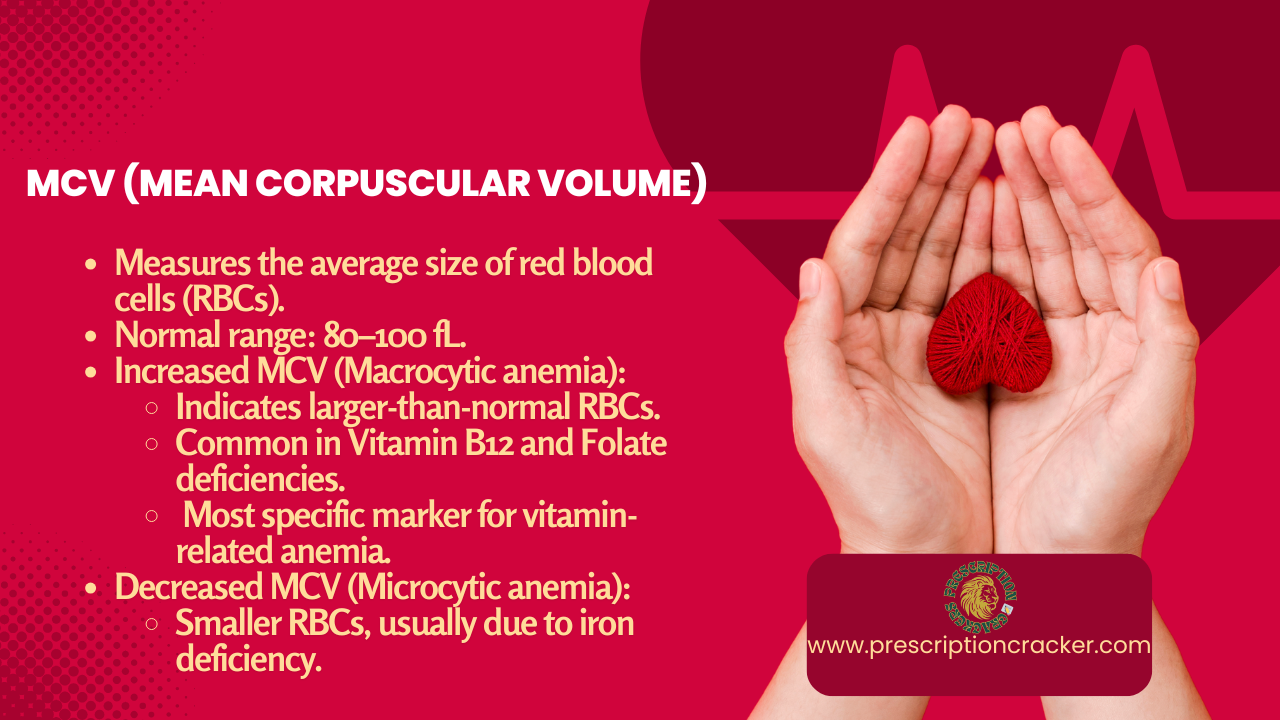
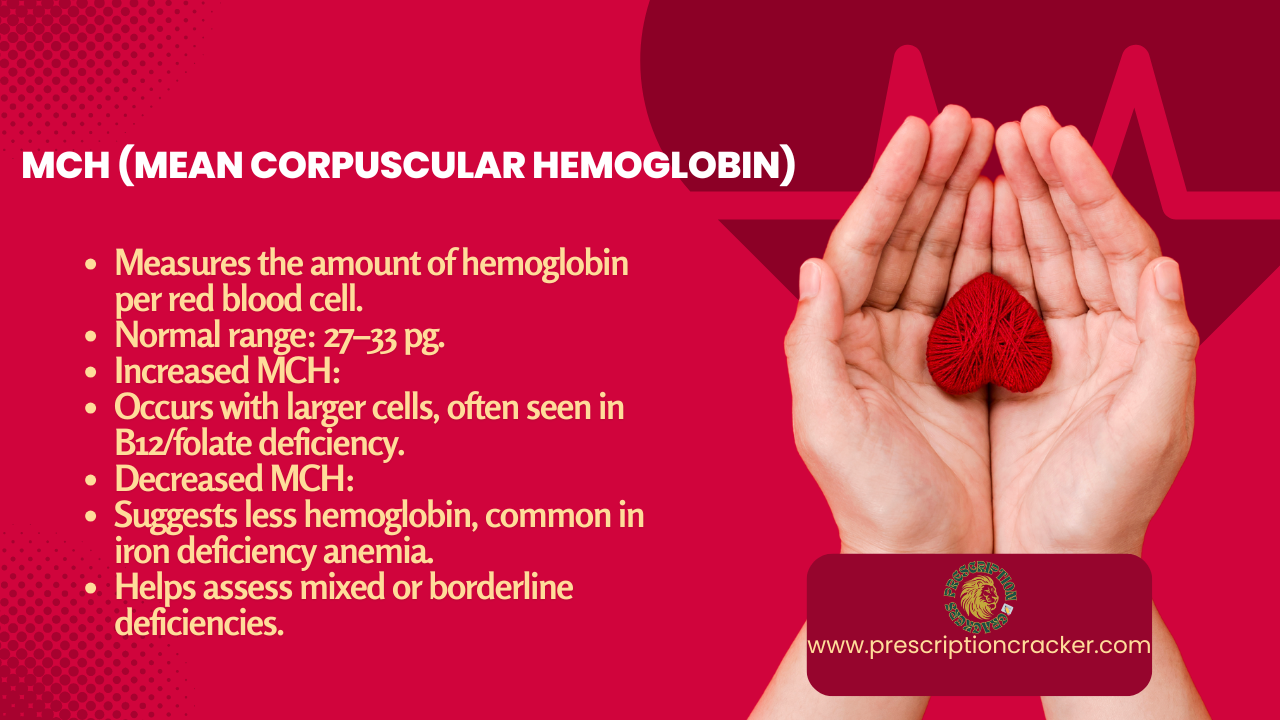
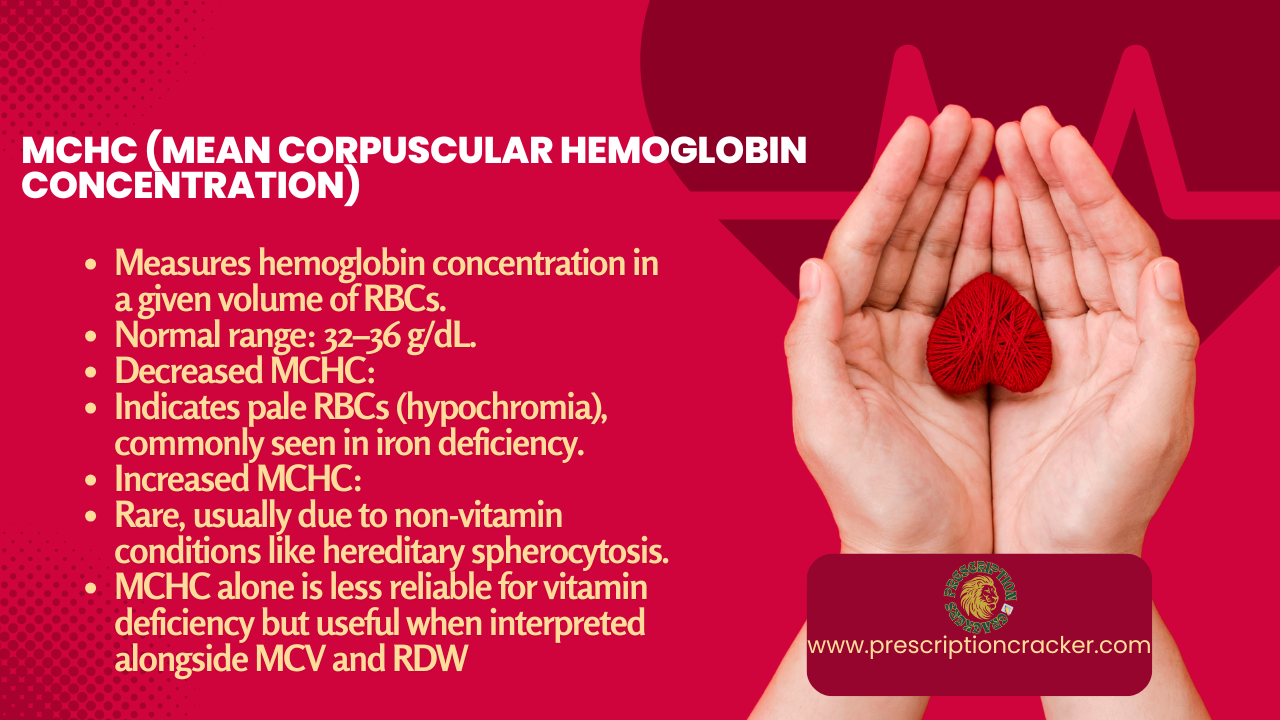
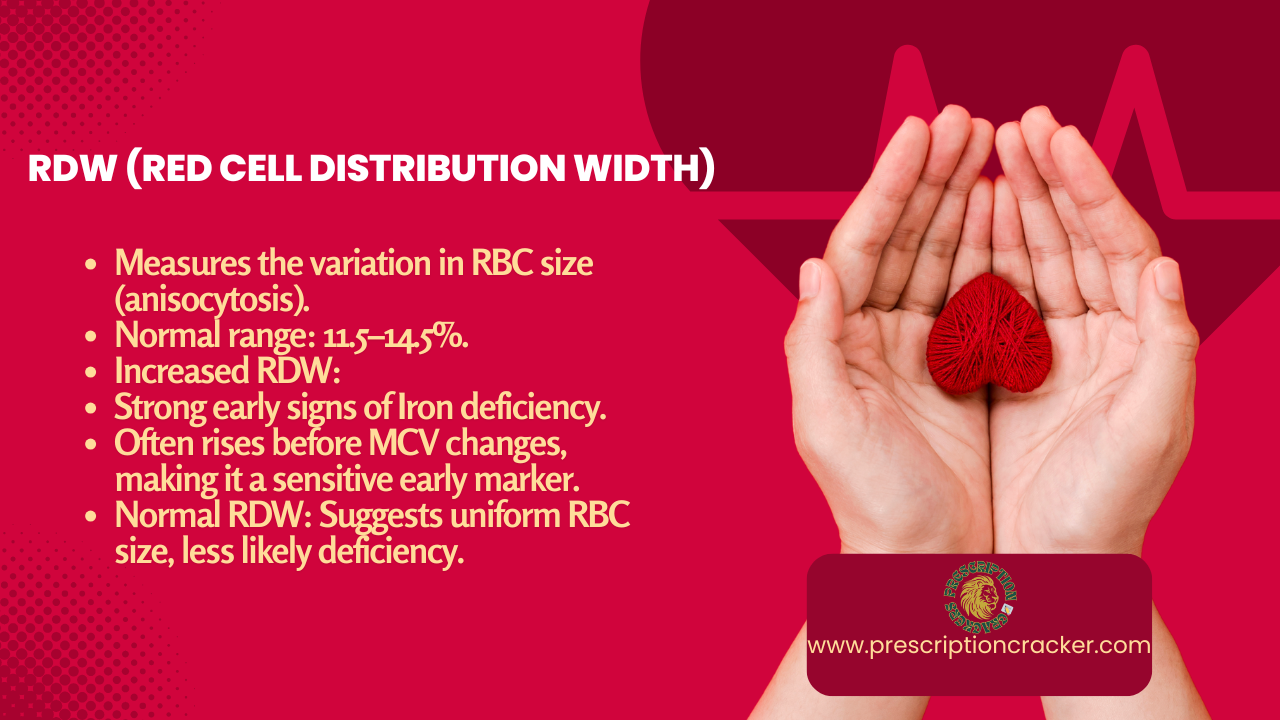
Now finally moving toward the main target of our article which is the interpretation of the vitamins & minerals deficiencies from the CBC report so, here are the four most important and targeted parameters that give us information regarding the vitamins & minerals deficiencies. Which are as follow:
- MCV (mean corpuscular volume)
- MCH (Mean Corpuscular Hemoglobin)
- MCHC (Mean Corpuscular Hemoglobin Concentration)
- RDW (Red Cell Distribution Width)
Basic information that will be covered includes: what are these parameters ? what does these parameters reflect ? what is the normal range of these parameters? What does the increase or decrease of these parameters indicates and how they relates to their vitamins & minerals deficiencies.
🩸 1. MCV (Mean Corpuscular Volume)
- Measures the average size of red blood cells (RBCs).
- Normal range: 80–100 fL.
- Increased MCV (Macrocytic anemia):
- Indicates larger-than-normal RBCs.
- Common in Vitamin B12 and Folate deficiencies.
- Most specific marker for vitamin-related anemia.
- Decreased MCV (Microcytic anemia):
- Smaller RBCs, usually due to iron deficiency.
🧬 2. MCH (Mean Corpuscular Hemoglobin)
- Measures the amount of hemoglobin per red blood cell.
- Normal range: 27–33 pg.
- Increased MCH:
- Occurs with larger cells, often seen in B12/folate deficiency.
- Decreased MCH:
- Suggests less hemoglobin, common in iron deficiency anemia.
- Helps assess mixed or borderline deficiencies.
💊 3. MCHC (Mean Corpuscular Hemoglobin Concentration)
- Measures hemoglobin concentration in a given volume of RBCs.
- Normal range: 32–36 g/dL.
- Decreased MCHC:
- Indicates pale RBCs (hypochromia), commonly seen in iron deficiency.
- Increased MCHC:
- Rare, usually due to non-vitamin conditions like hereditary spherocytosis.
- MCHC alone is less reliable for vitamin deficiency but useful when interpreted alongside MCV and RDW.
🔬 4. RDW (Red Cell Distribution Width)
- Measures the variation in RBC size (anisocytosis).
- Normal range: 11.5–14.5%.
- Increased RDW:
- Strong early signs of Iron deficiency.
- Often rises before MCV changes, making it a sensitive early marker.
- Normal RDW: Suggests uniform RBC size, less likely deficiency.
Does only CBC required to interpret these vitamin & minerals deficiency or there any other related test as well ?
So, going to our last question “Is there any other test as well for determination of these deficiencies?”
The answer is yes! there are also others available for the determination of the vitamins & minerals deficiencies like
- serum vitamin B12 test and
- serum folate test
- Serum ferritin test
No doubt, clues about the vitamins & minerals deficiencies we got from the CBC report provides ample evidence but it is often recommended to have these above-mentioned tests as well.
Disclaimer: The information provided in this article is for educational and informational purposes only and is not a substitute for professional medical advice, diagnosis, or treatment. Always consult your physician, pharmacist, or qualified healthcare provider with any questions you may have regarding a medical condition or laboratory results. Do not interpret CBC or any lab report without proper medical supervision



